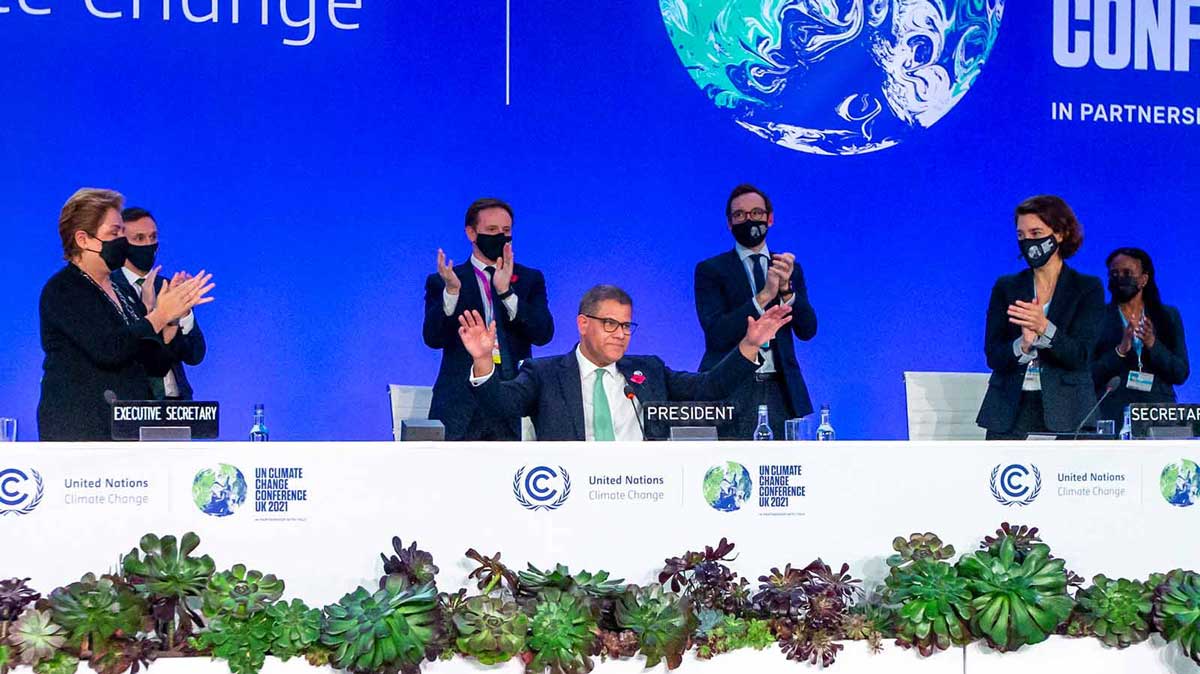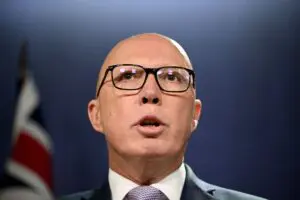After two long weeks of talks, the COP26 conference in Glasgow has come to an end, with countries recommitting to goals to keep global warming to within 1.5 degrees and putting pressure on laggards like Australia to deliver stronger 2030 emissions targets before next year’s talks in Egypt.
The COP26 came to an official close just before midnight on Saturday in Glasgow, more than 24-hours overtime, with clearly fatigued negotiators appearing relieved to have settled on a deal that settles the “rule book” for the Paris Agreement and keeps open a path to bridge the ambition gap.
“We started our work with a clear recognition that we are facing a climate crisis and, at the same time, that there are critical gaps in terms of mitigation, adaptation and finance,” UNFCCC executive secretary Patricia Espinosa told the closing plenary.
“I believe that the recognition of the relevance and the urgency of the task ahead has allowed many of you to support the consensus, even if it did not completely address all your concerns. We will be leaving Glasgow with clarity on the work we need to undertake to reach the 1.5-degree goal.”
Of crucial relevance to the Australian context is an agreement that countries will review and announce new 2030 emissions reduction targets ahead of the next conference.
Countries are already required to announce new 2035 targets before 2025, under the terms of the Paris Agreement, but given that current targets are insufficient to meet the 1.5-degree goal, countries will be asked to review their 2030 targets much earlier.
“[The COP] requests Parties to revisit and strengthen the 2030 targets in their nationally determined contributions as necessary to align with the Paris Agreement temperature goal by the end of 2022, taking into account different national circumstances.” – the final text says.
Australia has maintained the same target for 2030 emissions that the Abbott government announced in 2015. That target, to reduce emissions by between 26 and 28 per cent on 2005 levels, is widely seen as outdated and an insufficient contribution to global efforts.
While the decisions of international climate talks, as a rule, do not mention individual countries by name, an additional reference in the text that “urges Parties that have not yet communicated new or updated nationally determined contributions to do so as soon as possible” is about a direct reference to countries like Australia as one could expect to see.
However, while the ‘Glasgow Climate Pact’ – as it has been dubbed – will help maintain momentum for global cooperation on tackling climate change, it countries seeking to slow the transition away from fossil fuels succeeded in a last-minute attempt to water down its call for the end of coal power and fossil fuel subsidies.
The text had already been softened from an initial version that called for a phase-out of coal power and fossil fuel subsidies without caveats, to include references to ‘unabated coal’ and ‘inefficient subsidies’.
The original text, as proposed by COP President Alok Sharma on Saturday morning ahead of the closing plenary, read:
“[The COP] Calls upon Parties to accelerate the development, deployment and dissemination of technologies and the adoption of policies for the transition towards low-emission energy systems, including by rapidly scaling up clean power generation and accelerating the phase-out of unabated coal power and of inefficient subsidies for fossil fuels,”
India insisted in the final moments to change this wording to refer to a “phase down” of unabated coal power and subsidies, leaving it open to countries to continue using coal to some extent.
It still represents an unprecedent global statement on the looming end of coal power, the first time both coal and fossil fuel subsidies have been explicitly mentioned in a global agreement.
The last-minute maneuver was seen as an underhanded tactic that threatened to torpedo the ‘pact’ in the final minutes of two-week-long negotiations, and it prompted a tearful apology from Sharma to countries that complained that they were not in a position to properly respond to the proposed changes.
Representatives of the European Union, the Marshall Islands, Fiji, Mexico and countries belonging to the “Environmental Integrity Group” spoke out against the changes but accepted that on balance, it was not worth potentially jeopardising the entire COP outcome by refusing to allow the change altogether.
While India was the only country to formally push for the amendment, it is generally understood that they were working on behalf of a wider group of silent countries, including Australia, who opposed the language around phasing out coal but did not want to be seen publicly expressing that view.
“India’s last-minute change to the language to phase down but not phase out coal is quite shocking,” CEO of Climate Analytics Bill Hare said. “India has long been a blocker on climate action, but I have never seen it done so publicly.”
But Sharma appeared relieved to have landed the ‘pact’ despite the last-minute drama.
“We can now say with credibility that we have kept 1.5 degrees alive. But, its pulse is weak and it will only survive if we keep our promises and translate commitments into rapid action. I am grateful to the UNFCCC for working with us to deliver a successful COP26,” Sharma said.
“From here, we must now move forward together and deliver on the expectations set out in the Glasgow Climate Pact, and close the vast gap which remains. Because as Prime Minister Mia Mottley told us at the start of this conference, for Barbados and other small island states, ‘two degrees is a death sentence’.”










